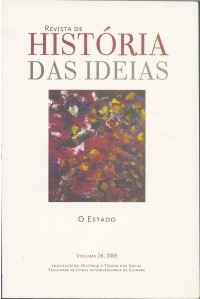Please use this identifier to cite or link to this item:
https://hdl.handle.net/10316.2/41671| DC Field | Value | Language |
|---|---|---|
| dc.contributor.author | Antunes, José | - |
| dc.date.accessioned | 2017-05-08T10:15:24Z | |
| dc.date.accessioned | 2020-09-30T11:26:37Z | - |
| dc.date.available | 2017-05-08T10:15:24Z | |
| dc.date.available | 2020-09-30T11:26:37Z | - |
| dc.date.issued | 2005 | - |
| dc.identifier.issn | 0870-0958 | - |
| dc.identifier.issn | 2183-8925 (digital) | - |
| dc.identifier.uri | https://hdl.handle.net/10316.2/41671 | - |
| dc.description.abstract | As relações entre Igreja e Estado, na Idade Média, estão intrinsecamente vinculadas à essência da tradição europeia, que tem como fonte a Antiguidade, pagã e cristã. Esta tradição no Ocidente fez da Europa uma comunidade de civilização, que subsistiu sempre e nem as posteriores divisões políticas, no decorrer dos séculos, conseguiram alterar. Pode até afirmar-se, sem exagero, que a própria União Europeia entronca nela a sua verdadeira génese e é dela inseparável. Constituída pela dupla herança, do humanismo greco-romano e do cristianismo, é inevitável a existência de dificuldades de conciliação entre as várias concepções de que estes dois valiosos contributos são portadores, versem elas sobre o poder político em geral ou sobre o Estado. Entre os problemas que o mundo ocidental viu surgir, com o aparecimento do cristianismo, e que a Idade Média herdou, mas que eram desconhecidos e até incompreensíveis para toda a Antiguidade clássica, estão a nova noção cristã de humanidade, a distinção entre o espiritual e o temporal e o aparecimento da Igreja como autoridade fora dos quadros do Estado. Este encontro das duas culturas, protagonizadas pela razão e pela fé, efectuou-se através dos Padres da Igreja (que foram os melhores transmissores do humanismo pagão) e desde então jamais deixaram de exercer uma sobre a outra uma influência profunda. Mas quer se tenham oposto ou unido, constituem dois elementos constantes da tradição europeia, pelo que aJdade Média é uma unidade espiritual, moral e até material, que fez da Europa urna comunidade de civilização, mas não uma comunidade política. Ao contrário da Época Moderna, cuja característica principal é definitivamente a divisão política, embora sem comprometer a comunidade de civilização. | por |
| dc.description.abstract | The relation between Church and State in the Middle Ages is intrinsically tied to the essence of the European tradition, the source of which lies in Antiquity, both pagan and Christian. This tradition of the Western world turned Europe into a civilisational community, which has remained ever since and not even the subsequent political partitions throughout the centuries managed to change. One may even state without exaggerating that the European Union has in it its true genesis and the one is inseparable from the other. As heirs to a double inheritance, Greek-Roman humanism and Christianity, conciliation problems between the disparate views which these two valuable legacies bear witness to, either on political power in general or the State, inevitably arise. Amongst the problems, which the Western world saw develop with the rise of Christianity and the Middle Ages inherited, but which were unknown or even unintelligible to the classical antiquity, are the new Christian concept of humanity, the differentiation between spiritual and temporal and the emergence of the Church as an authority outside State framework. Such an encounter between these two cultures, epitomised by faith and reason, was materialised through the Church priests (who were the leading transmitters of pagan humanism) and they have continued ever since to influence each other profoundly However, regardless of whether they clashed or combined, these are two components of the European tradition. The Middle Ages are, therefore, a spiritual, moral and even material unity, which made Europe into a civilisational community, albeit not a political one. The Modern Age, on the other hand, features essentially political division, although it does not compromise the civilisational community. | eng |
| dc.language.iso | por | - |
| dc.publisher | Imprensa da Universidade de Coimbra | - |
| dc.rights | open access | - |
| dc.title | A tradição europeia e as relações entre os dois poderes medievais: Igreja e "Estado": a filosofia subjacente | por |
| dc.title.alternative | The European tradition and the relations between the two medieval powers: the Church and the "State": their underlying philosophy | por |
| dc.type | article | - |
| uc.publication.collection | Revista de História das Ideias vol. 26 | - |
| uc.publication.firstPage | 71 | - |
| uc.publication.lastPage | 93 | - |
| uc.publication.location | Coimbra | - |
| uc.publication.journalTitle | Revista de História das Ideias | - |
| uc.publication.volume | 26 | por |
| dc.identifier.doi | 10.14195/2183-8925_26_4 | - |
| uc.publication.orderno | 5 | - |
| uc.publication.area | Artes e Humanidades | - |
| uc.publication.manifest | https://dl.uc.pt/json/iiif/10316.2/41671/248469/manifest?manifest=/json/iiif/10316.2/41671/248469/manifest | - |
| uc.publication.thumbnail | https://dl.uc.pt/retrieve/11862684 | - |
| item.grantfulltext | open | - |
| item.fulltext | With Fulltext | - |
| Appears in Collections: | Revista de História das Ideias | |
Files in This Item:
| File | Description | Size | Format | |
|---|---|---|---|---|
| a_tradicao_europeia_e_as_relacoes.pdf | 339.84 kB | Adobe PDF |  |
Items in DSpace are protected by copyright, with all rights reserved, unless otherwise indicated.
